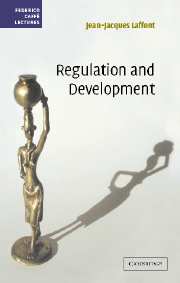Book contents
- Frontmatter
- Contents
- Publisher's acknowledgment
- Foreword
- Preface
- Introduction
- 1 Overview of regulatory issues
- 2 The rent extraction–efficiency trade-off
- 3 A positive theory of privatization
- 4 Enforcement, regulation, and development
- 5 Access pricing rules for developing countries
- 6 Universal service obligations in LDCs
- 7 Design of regulatory institutions in developing countries
- 8 Separation of regulatory powers and development
- 9 Concluding remarks
- References
- Index
3 - A positive theory of privatization
Published online by Cambridge University Press: 05 June 2012
- Frontmatter
- Contents
- Publisher's acknowledgment
- Foreword
- Preface
- Introduction
- 1 Overview of regulatory issues
- 2 The rent extraction–efficiency trade-off
- 3 A positive theory of privatization
- 4 Enforcement, regulation, and development
- 5 Access pricing rules for developing countries
- 6 Universal service obligations in LDCs
- 7 Design of regulatory institutions in developing countries
- 8 Separation of regulatory powers and development
- 9 Concluding remarks
- References
- Index
Summary
Introduction
No region in the world is in greater need of new investment and more efficient operation of its infrastructure than Sub-Saharan Africa. The almost universally poor quality of the region's infrastructure directly impacts on the living standards of its people and constrains private investment in other activities.
This quote from the Foreword of Kerf and Smith (1996) raises two types of issues in relation to privatization. (1) Is infrastructure privatization a valuable option for very poor countries? This question will lead us to review the available theory about the role of property rights in the performance of public utilities. However, the main emphasis of this chapter will be on a more positive question which must be elucidated by a theory of reform if privatization appears to be the direction to go. (2) When does privatization occur in countries where governments clearly have private agendas?
Our starting point will be what appears currently as an internal contradiction of many theories of privatization. Public ownership is criticized for allowing excessive political interference by governments who are not benevolent. Privatization is supposed to curb this influence; however, privatization itself is decided by politicians. It is therefore important to understand why the governing bodies find it advantageous to choose the path of privatization.
- Type
- Chapter
- Information
- Regulation and Development , pp. 64 - 95Publisher: Cambridge University PressPrint publication year: 2005

